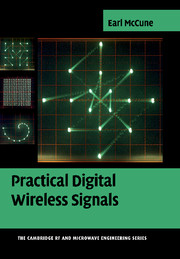Book contents
- Frontmatter
- Contents
- Preface
- Definitions and acronyms
- Terminology and notation
- 1 Keying, states, and block diagram construction
- 2 Common issues and signal characterization
- 3 Important details on results from Shannon, Nyquist, and others
- 4 Digital amplitude modulation (ASK)
- 5 Digital frequency modulation: FSK
- 6 Digital phase modulation: PSK
- 7 Combined digital modulations: QAM and OFDM
- 8 Spread spectrum
- 9 Wireless propagation and antenna fundamentals
- 10 Principles of coding
- 11 Multiple access techniques
- 12 Signal tradeoffs and system evolution
- Tutorial Appendices
- Appendix A Phasor review
- Appendix B Decibels (dB) really are simple
- Appendix C Analog modulation basics
- Appendix D Quadrature modulation and demodulation principles
- Appendix E Polar modulation and demodulation principles
- Appendix F The derivative-zeroed pulse family
- Appendix G Selected DWC standards and their modulations
- Index
Appendix D - Quadrature modulation and demodulation principles
Published online by Cambridge University Press: 04 August 2010
- Frontmatter
- Contents
- Preface
- Definitions and acronyms
- Terminology and notation
- 1 Keying, states, and block diagram construction
- 2 Common issues and signal characterization
- 3 Important details on results from Shannon, Nyquist, and others
- 4 Digital amplitude modulation (ASK)
- 5 Digital frequency modulation: FSK
- 6 Digital phase modulation: PSK
- 7 Combined digital modulations: QAM and OFDM
- 8 Spread spectrum
- 9 Wireless propagation and antenna fundamentals
- 10 Principles of coding
- 11 Multiple access techniques
- 12 Signal tradeoffs and system evolution
- Tutorial Appendices
- Appendix A Phasor review
- Appendix B Decibels (dB) really are simple
- Appendix C Analog modulation basics
- Appendix D Quadrature modulation and demodulation principles
- Appendix E Polar modulation and demodulation principles
- Appendix F The derivative-zeroed pulse family
- Appendix G Selected DWC standards and their modulations
- Index
Summary
This appendix focuses directly on the quadrature modulator (QM) and quadrature demodulator (QD) system blocks. In any real system there are errors in implementing circuitry, and modulators are no exception. Applying a linear, first-order error model to the ideal quadrature modulator equation, it is shown that there are nine error terms that the design engineer must pay attention to. Each of these error terms is examined for its effect on the final output signal. It is shown that, in general, offset errors produce signal leakages, and gain errors produce modulation distortions. Error signals that can be filtered out are identified. Non-filterable leakage and distortion terms that require nulling adjustments are also identified. A similar analysis of the quadrature demodulator shows an additional six first-order error terms. After identifying the ideal values for all fifteen error terms, it is shown that the derived equations all reduce to ideal transmission.
Ideal quadrature modulation and demodulation
Quadrature modulation is based upon the unique translation between polar and Cartesian (rectangular) coordinates. Any signal which is described by a polar magnitude (A) and phase angle (φ) can equivalently be described with rectangular (x and y) coordinates.
- Type
- Chapter
- Information
- Practical Digital Wireless Signals , pp. 359 - 371Publisher: Cambridge University PressPrint publication year: 2010

